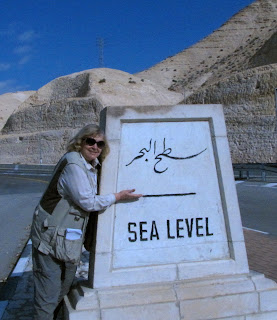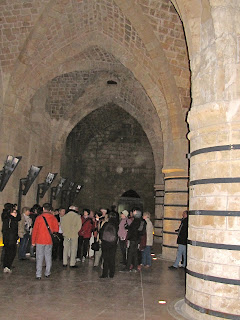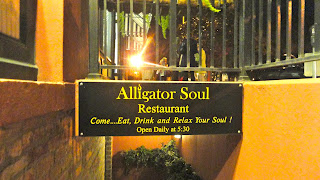 |
| Cherry tomatoes were developed in Israel. |
 |
| Pick up a statue of Liberty along Akko's waterfront. |
Israel can be a challenge for Levelers because not much of it is. Civilization has been walking and warring on it for far too long for it to be level. A lot of what you want to see is high up or way down.
 |
| Me at sea level. |
Worth the effort though.
I began with a tour of Classic Galilee organized by the Israeli Ministry of Tourism which was hosting the Freelance Council of the Society of American Travel Writers. They wanted to show us everything and we were anxious to see it, but not enough time had been allotted.
Tip: Don't expect to do it all in two weeks. You can't. Israel may be a tiny strip on the map, but there is a lot to see. Our guides were just as frustrated as we were. If there is a particular site/sight you care about, ask how much time will be spent there before signing on to a tour.
 |
| Downtown Haifa from The Colony Hotel. |
I was looking forward to seeing Haifa, a truly international city of yellow stone, but by the time we arrived it was dark and rainy and when we left the next morning it was gray and rainy so all I saw - and it was temptingly beautiful - was from a bus window.
Tip: Possibly just as well because Haifa rises sharply from the Mediterranean Sea and the prettiest parts are high up on steep slants. Despite that, I would like to have spent time in the terraced gardens of the Baha'i Shrine, a UNESCO World Heritage Site. From bottom to top of those gardens, there are 1,800 steps!
 |
| Haifa from above. The golden dome at left is the Baha'i Shrine. |
This center of the Baha'i faith seems to encompass all major religions in harmony and certainly warrants another, longer visit. We stayed at The Colony Hotel which I can highly recommend. There's a elevator to your right from street level to the lobby and another inside.
 |
| These streets of Akko/Acre have seen a lot of walking. |
Akko, across the curving edge of the Mediterranean is worth a whole day; we had a few hours. People have lived here since the Phoenician era, more than 4,000 years ago, making it one of the world's oldest continuously inhabited city. Julius Caesar was here, Paul of Tarsus walked its streets, Baha Ullah, founder of the Baha'i faith, died here.
The city paid tribute to Pharaoh Thutmose III in the 16th century B.C. Persians took it from the Israelis, Alexander the Great took it from them, Ptolemy II of Egypt inherited it but the Muslims took it from his heirs. Then came the Crusaders in 1104 A.D. They took it, Saladin retook it and Richard III took it back. Napoleon was about the only general of note who failed to capture it.
 |
| The Crusaders' Citadel. |
 |
| Entering the Hospitallers' hospital. |
 |
| Archaeologists wondered for years where the steps went. |
 |
| ...until they uncovered the knights' hall... |
a vast knight's hall, now underground, and a large underground tunnel leading from the hall to the battlements and port.
 |
| ...and the tunnels. |
There are churches and mosques of note as well as another set of Baha'i gardens commemorating their founder.
There's a lively market and some excellent restaurants. (It's said the best hummus in Israel is served here, but I can't prove it; never had a bad hummus in Israel and ate it every day.)
Leia Mais…











































